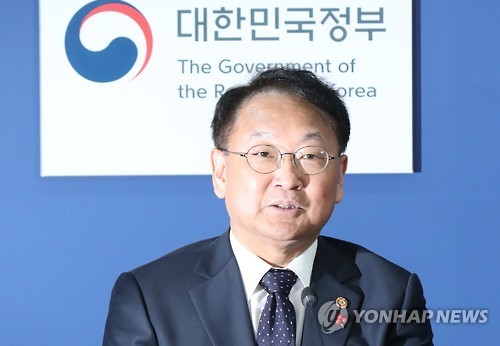South Korea’s finance minister vowed Monday to carry on restructuring and supporting troubled industries this year, urging two state-owned policy lenders to continue their efforts.
Finance Minister Yoo Il-ho led a ministerial-level meeting in Seoul to discuss detailed plans on revamping four key industrial sectors -- shipbuilding, shipping, steelmaking and petroleum.
 |
(Yonhap) |
“We have to carry out sweeping reform in earnest based on the principle and framework we set last year,” Yoo said. “We will do our best to go through the restructuring process as planned in order to help the businesses gain competitiveness.”
Last year, the government came up with action plans to boost the competitiveness of the four struggling sectors.
For the shipbuilding industry, which has been suffering from slow demand and fierce competition from China, the government had unveiled a restructuring plan to downsize and promote higher value-added technologies.
To carry on such efforts this year, the government will order two warships worth 1.5 trillion won ($1.29 billion) in the first half of this year and 10 ships via a shipping fund to aid shipyards suffering a fall in new orders.
For the shipping industry, which saw the collapse of the county’s biggest player Hanjin Shipping last year, the government will inject 6.5 trillion won in financing.
The government will speed up restructuring of the steelmaking and petrochemical industries to reduce their supply glut and develop high-value added technologies.
The finance minster also urged innovation at the two policy lenders, the Korean Development Bank and the Export-Import Bank of Korea.
“Minimizing the public burden of corporate failure depends on the innovation of the two banks,” Yoo said.
The two state-owned banks have been blamed for failing to supervise corporate restructuring of the troubled companies with their lax lending process.
Under the government’s plan, KDB and Eximbank will intensify their risk-management efforts and tighten their loan screening process.
Eximbank said it will expand its credit assessment system to foreign debtors, while its risk management panel will accept an additional external director as a way of bolstering the independent decision-making process.
KBD will look into the industry and balance sheets before giving out loans to a company, the bank said.
Meanwhile, the finance minister picked as challenges for South Korean companies the protectionism led by US President Donald Trump, volatility of interest and exchange rates as well as intensifying competition among countries to get ahead in the fourth industrial revolution. By Park Ga-young
By Park Ga-young (
gypark@heraldcorp.com)







![[Today’s K-pop] Blackpink’s Jennie, Lisa invited to Coachella as solo acts](http://res.heraldm.com/phpwas/restmb_idxmake.php?idx=644&simg=/content/image/2024/11/21/20241121050099_0.jpg)
